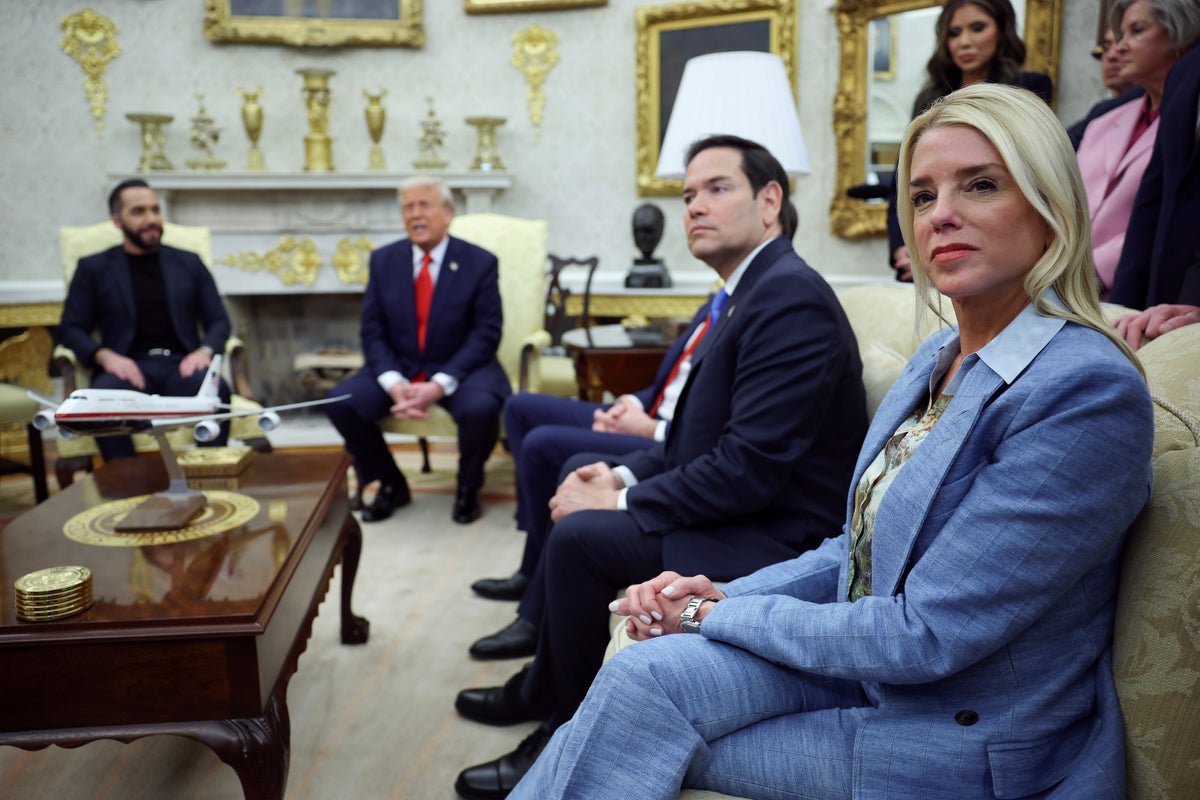Attorney General Pam Bondi appeared Monday to sidestep commenting directly on whether it’s legal to send U.S. citizens to El Salvador to serve in the country’s notoriously brutal prisons, after President Trump said earlier in the day he’s “all for” sending Americans to the facilities during a White House meeting with Salvadoran President Nayib Bukele.
Bondi was asked during an interview with Jesse Watters on Fox News whether Trump’s idea was legal.
The attorney general did directly comment on the legality of Trump’s eager suggestion. She praised the president’s push to lock up serious offenders, but also said they wouldn’t be sent “anywhere.”
“These are Americans who he is saying have committed the most heinous crimes in our country, and crime is going to decrease dramatically because he has given us a directive to make America safe again,” Bondi said. “These people need to be locked up as long as they can, as long as the law allows. We’re not going to let them go anywhere, and if we have to build more prisons in our country, we will do it.”
During the Oval Office meeting with Bukele, Trump himself suggested he wasn’t sure his idea was legal.
“I said to Pam — I don’t know what the laws are, we always have to obey the laws — but we also have homegrown criminals that push people into subways, that hit elderly ladies on the back of the head with a baseball bat when they’re not looking, that are absolute monsters,” Trump said. “I’d like to include them in the group of people to get them out of the country. But you’ll have to be looking at the laws.”

During a White House meeting earlier this week, Bondi said she is “studying the law” regarding the idea.
The Independent has contacted the Justice Department for comment.
Experts have consistently said the government cannot legally send U.S. citizens out of the country to be jailed in a foreign nation for domestic offenses.
“This is so incredibly illegal that there’s not even a hint of a possible way to do it under any circumstances whatsoever,” Aaron Reichlin-Melnick, senior fellow at the American Immigration Council think tank, wrote on X in February when El Salvador first offered to house American prisoners. “It violates international law and the U.S. Constitution. Period. End of story.”
“I know of nothing that would give the president the authority to force U.S. citizens serving federal prison sentences to serve their time in a different country’s prisons,” law professor M. Isabel Medina with Loyola University New Orleans College of Law previously told The Independent.
“To my knowledge there is no statutory provision that gives the [Bureau of Prisons] discretion to send [citizens] outside of the federal corrections system,” she said. “Other than the lack of statutory authority, another complication would be application of the Eighth Amendment, procedural due process, First Amendment and other constitutional protections that federal prisoners are entitled to while serving their sentences.”
In addition to facing legal scrutiny for its proposal to jail Americans in Salvador, the administration has also prompted controversy for refusing to return a Maryland man the government has admitted to mistakenly deporting to El Salvador, despite a court order he not be removed to that country.
The Supreme Court has ordered the administration to “facilitate” Kilmar Abrego Garcia’s return to the U.S., but the administration has argued it has neither the obligation nor the power to return the man, while Bukele said Monday he also lacks the power to return the man and bring him to the U.S.
El Salvador is reportedly being paid $6 million by the Trump administration to house prisoners shipped there.


